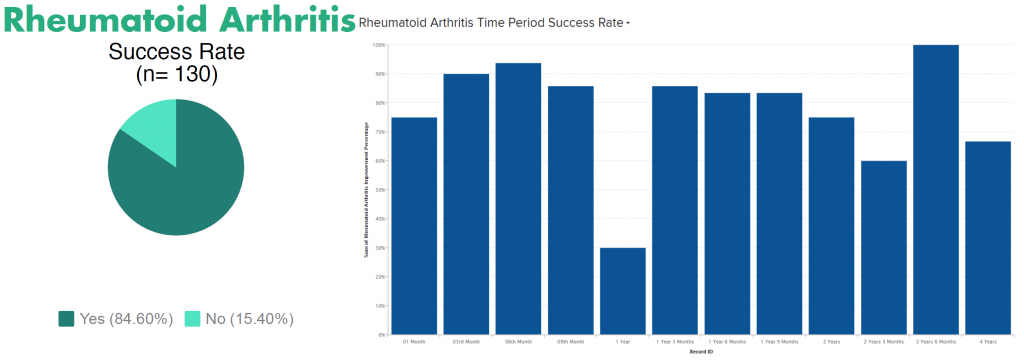What is Rheumatoid Arthritis?
Rheumatoid arthritis, or RA, is a type of autoimmune disease that attacks the joints and causes inflammation. RA affects over 1.5 million people in the United States. The joint inflammation can be damaging to both the cartilage and the bones of the joint. The inflammation can limit the ability of the joint to move and can eventually destroy the joint itself. Patients with rheumatoid arthritis experience pain, swelling, and joint stiffness. See our blogs Rheumatoid Arthritis vs Gout: What’s the Difference? and Burning, Tingling and Pain. Severe cases of RA can lead to loss of mobility, joint deformity and permanent disability for some people. Other symptoms include dry eyes, impaired vision, sensitivity to light, shortness of breath, inflammation of blood vessels, anemia and changes in the skin near the joints. Rheumatoid arthritis most frequently affects the hands, wrists, feet, and ankles. Knees, elbows, hips, and shoulders can also be involved. The spine is involved in a minority of cases. RA can also affect the systems of the body, like the digestive system and the respiratory system.
How Do You Use Stem Cells for Rheumatoid Arthritis?
For patients with rheumatoid arthritis, Innovations Stem Cell Center deploys stem cells with injections into involved joints and IV infusion. Stem cells from fat are highly anti-inflammatory, so most RA patients see a general decrease in disease activity. Damaged tissue and inflammation attracts stem cells through growth factor chemical messages, and deployed stem cells find the damaged or diseased tissue and begin repairs. The results have been quite good: (see our blogs What are Stem Cells? and Understanding Adipose-Derived Stem Cells).
Results for the first 130 Rheumatoid Arthritis Patients for the Cell Surgical Network

Patients begin seeing results in the first few weeks of treatment. Some patients may require additional deployments over time, but most have a good response to a single therapy for several years. We DO recommend you continue your RA disease-modifying drugs until your rheumatologist recommends stopping them.
Am I a Candidate for Stem Cells for Rheumatoid Arthritis?
Patients with rheumatoid arthritis (RA) who are ideal candidates for stem cell therapy include:
- Patients who have not responded to their treatments
- Patients who are no longer responding to current treatment
- Patients who cannot tolerate recommended treatment(s)
- Patients who want to avoid the recommended treatment such as surgery, or many disease-modifying anti-rheumatic drugs (DMARD)
- Patients for which nothing has been effective
Good Candidates for Stem Cells for Arthritis are:
- Persons who have no medical condition that would from having minor surgery under local anesthesia. If the person’s medical condition is in question, a surgical clearance from your doctor may be requested. The great majority of patients are able to undergo the procedure.
- When possible, persons taking anti-coagulants (blood thinners) should stop them for 2-4 days around the procedure. If necessary, some patients may be able to continue their blood thinners with approval from our office.
- Individuals seeking to avoid joint replacement surgery. At this time, stem cells are not able to restore joint deformity from RA.
- Individuals having an inadequate response to treatment or unwanted side effects on their RA medications.
- Individuals wanting to maintain joint health and avoid future problems with RA.
Stem cell therapy is minimally invasive, which gives patients an alternative to painful surgery and a lengthy recovery. It also reduces inflammation and often the need for medications.
When Will I See Results?
Patients who undergo stem cell therapy for rheumatoid arthritis (RA) report a reduction in their painful symptoms and an increase in range of motion and mobility. Stem cell therapy helps to quickly reduce joint inflammation, and many patients see improvements in just 1 to 2 days. Anti-inflammatory results of the procedure last 2 to 3 months and many patients see a gradual improvement in their overall condition over time. Most patients see a long-lasting reduction in RA disease activity beginning at about 3 months and continuing. Some patients desire repeat treatment, but many patients do well for several years with a single treatment.
Stem Cell Therapy for Rheumatoid Arthritis Cost
The cost of the initial treatment ranges from $5,000 to $10,000. The range in cost is dependent on the complexity of delivering the cells back to you. For example, spine conditions require multiple physicians to deliver the cells back to your body and this requires an increase in cost as multiple doctors are involved in the procedure. For many people the initial treatment is all that is needed; however, for some conditions, subsequent treatments may be required and these are done at a reduced fee.
Innovations Medical provides Stem Cell Therapy procedures at our Dallas and Fort Worth practice locations.
